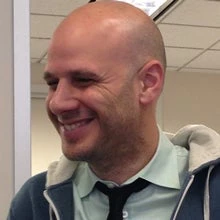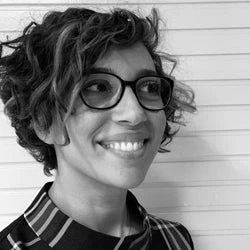We finish our series of highlighting our recently recruited researchers. Today we cover researchers who work on a range of applied micro topics, including migration and refugees, and gender, agriculture and rural development. We again encourage you to reach out to them if you are operational colleagues looking for researchers to work with you, or departments looking for potential seminar speakers.
Migration and Refugees
Sandra Rozo is a development economist whose research interest are centered on exploring the effects of forced migration within hosting economies and of the role of public policies in supporting these migrants and their hosting communities. Her work aims at advancing our knowledge on three dimensions: i) studying the economic and political impacts of forced migration in developing countries and the mechanisms driving those effects, ii) examining the impacts of humanitarian interventions that aim at supporting migrants and locals, and iii) exploring how to increase social cohesion between migrants and locals. Some of her recent research papers have been published at the Journal of Labor Economics, the Review of Economics and Statistics, and the Journal of Development Economics. Some of Rozo’s recent research projects include collecting a representative sample of Venezuelan migrants in Colombia to evaluate the impacts of a large amnesty offered to undocumented migrants. She is also part of the research team collecting the Syrian Life Refugee Study, the first representative panel of Syrian refugees being presently collected in Jordan and has also been recently implementing experiments to reduce prejudice and improve prosocial behaviors towards migrants.
General Applied Micro
John Loeser is an Economist at the Development Impact Evaluation (DIME) group at the World Bank. John's research focuses on applying theory to expand the set of questions we can answer with impact evaluations. One set of projects focus on technology adoption in smallholder agriculture, including work demonstrating that labor market frictions constrain adoption of irrigation in Rwanda and applying revealed preference approaches to value groundwater reserves in India. A second set concerns household finance, with work in progress applying metaänalysis to estimate dynamic responses to temporary cash transfers in lower income countries and developing revealed preference approaches to measure consumer surplus from access to microfinance. A third set considers intrahousehold decision making, including work in progress that estimates the impact of women's participation in public works on intrahousehold decision making.
Anja Sautmann’s most recent work concerns the design of so-called adaptive experiments. These experiments adjust flexibly over time, based on what was already learned and what the precise research objective is, and they can often get results faster than traditional impact evaluations. Anja’s research shows for example how adaptive designs can inform the “policy choice problem”, where the goal is to choose quickly between many different program variants or policy options -- similar to A/B testing used by many tech companies. Anja is very interested in new applications of this method in policy research and operations. Beyond that, one of Anja’s long-term research interests has been the demand for and use of primary healthcare. Getting good healthcare involves many complex choices: a person who is sick must determine whether their symptoms warrant a doctor visit or not, doctors must decide how to diagnose and what to prescribe, patients must follow through by purchasing and completing the treatment course. Working primarily in Mali, Anja has investigated the potential for overuse and underuse of care at these different margins, and how policy can effectively intervene. This is part of Anja’s larger interest in how individual behavior and incentives shape optimal policy design.
Gender
Iva Trako is an Economist in the Development Impact Evaluation (DIME) unit at the World Bank. Her main research interests include gender, education and social protection. One strand of her research explores whether improving law enforcement responses to gender-based violence increases the reporting and deterrence of violence against women, and whether this policy intervention has an inter-generational impact on the human capital investment of children. Exploiting the gradual rollout of women’s justice centers in Peru, Iva and co-author find that the opening of a center reduces the incidence of gender-based violence by 10%, and consequently improves children’s education outcomes. Another strand of her work analyzes the impact of fertility on parental labor force participation, with particular attention to the intervening role of childcare provided by grandparents in extended families. Her work in education includes projects in Afghanistan and Tanzania that focus on measuring the quality of the education system in terms of student effort, teaching practices, school management and infrastructure. In addition, she works on understanding supply and demand side barriers to girl´s education in Pakistan and DRC, and explores innovative solutions to improve their welfare. Iva is interested in contributing to issues related to gender, human capital and skills, and social protection.
S Anukriti is an Economist in the Human Development team of the Development Research Group at the World Bank. She is an applied micro-economist whose research examines the underlying causes of gender inequalities in developing societies, and explores mechanisms that can bring about gender equity. She is excited to work on projects related to all aspects of gender. She is also the Gender Focal Point for DECRG. While most of her prior work is based in South Asia, she is also collaborating with operational teams in Middle East & North Africa, as well as Eastern Europe and Central Asia. She is most excited about her ongoing and upcoming work on the linkages between women’s economic empowerment and women’s social networks. She is also interested in gender aspects of labor market informality. You can find more about her interests and publications on her website.
Agriculture and Rural Development
Benedetta Lerva will join DIME’s Gender, Economic Opportunity & Fragility unit. Her research investigates barriers to agricultural modernization in low-income countries, why they exist and how to overcome them. She finds large social benefits of selected agricultural technologies that are not realized in practice since the technologies are not profitable to farmers individually. She is currently working on how a digital economy can allow farmers to participate in global markets and promote sustainable food chains. One of her papers finds large social benefits of selected agricultural technologies that are not realized in practice since the technologies are not profitable to farmers individually. Benedetta’s operational work focuses on social protection programs and optimizing targeting of World Food Programme interventions in emergency settings induced by conflicts and natural disasters. As emergency settings are increasingly connected to climate change, she is looking forward to expanding this line of work to study adaptation strategies for rural and agricultural communities.
Lucas Zavala will join DIME’s unit on Economic Transformation and Growth in 2022 after a one-year post-doctoral fellowship at Princeton. He studies competition in global value chains, with a focus on emerging economies. In his Job Market Paper, he uses data from the Ecuadorian tax authority to link large agricultural exporters to the small farms that supply them. He finds that farmers receive a lower fraction of the surplus when the exporter dominates more of the local market, and that their income increases less when the international price increases. Using these facts, together with a simple model of farmer crop choices, he measures the consequences of market power for farmer welfare and estimates the potential impact of Fair Trade programs and minimum support prices. In ongoing work, he and coauthors examine the forces that shape competition both locally and internationally, such as labor market regulations in Ecuador and Non-Tariff Barriers to trade across Latin America. Going forward, he hopes to design and evaluate innovative solutions for fighting market power, such as scalable Fair Trade policies and blockchain technology for tracking payments to farmers.
Dahyeon (DJ) Jeong is an Economist in the Development Impact Evaluation (DIME) group at the World Bank. His main research interests include agriculture, labor, and social protection. At the intersection of agriculture and labor, his paper on rural labor markets in Tanzania quantifies the role of search frictions on agricultural wage dispersion. This paper finds that an SMS-based messaging app that connects agricultural workers and employers reduces search costs and wage dispersion. On social protection, he and his co-authors are currently evaluating a large cash transfer program in rural Liberia and Malawi. This work has been measuring the dynamic impact of cash transfers throughout agricultural seasons for more than a year via high-frequency phone surveys. A spinoff of this project studies the impact of COVID-19 on food security and finds that food security remained stable despite severe market disruptions in rural Liberia and Malawi. Currently, he is involved in several impact evaluation initiatives with World Food Programme (jointly with other DIME researchers) and is investigating the impact of public works on women’s autonomy and the resilience of households as well as the impact of school feeding programs.





Join the Conversation